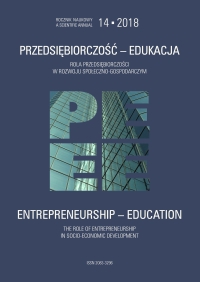Opportunities and Constraints in the Implementation of Revitalisation Programmes of Rural Areas in the Małopolskie Voivodeship
DOI:
https://doi.org/10.24917/20833296.14.7Keywords:
entrepreneurship in the countryside, Małopolskie voivodeship, revitalisation, rural areas, rural renewal programmeAbstract
The subject of the present article are revitalisation programmes submitted for implementation by municipal territorial self-government units in Małopolskie voivodeship in the years 2015-2016. The aim of the paper is the assessment of revitalisation assumptions and definition of their implementation possibilities in the context of ever-present socio-economic problems of rural areas in particular regions of Małopolskie voivodeship. In addition, the paper concentrates on showing the socio-economic needs of villages of Małopolskie voivodeship and their wide diversity in the region, discussing various constraints that may weaken the effectiveness of the revitalisation programs under implementation. The aim of the paper was accomplished through the analysis of the documents that constitute the basis for the implementation of revitalisation programmes, and the presentation of the diversity of socio-economic development of rural municipalities using ratio analysis, as well as carrying out the typology of rural areas of the region. The key issue of a large part of villages of Małopolskie voivodeship is their low economic efficiency resulting from high registered and hidden unemployment, low non-agricultural activity of residents, or decreasing land-use efficiency. Many areas are characterised by progressive exclusion from development and inability to use their resources as a basis for good local economy. Much attention has been paid to the effectiveness of the revitalisation programme in resolving rural problems which, in the authors’ opinion, is mainly related to obtaining broad support from the residents and local entrepreneurs, local self-government involvement, followed by adequate support from the municipalities through actions at the regional level, as well as greater flexibility of these programmes, both with regard to the aim of revitalisation and the location of tasks within the municipality. Actions related to this programme should significantly improve these areas of needs of residents. They should also limit the existing peripherality of many villages, visible in remoteness and difficult access not only to larger socio-economic centers but also to today’s information gathering methods, and contact with culture and knowledge, necessary for building strong social ties and civilisation development.
References
Flaga, S., Sroka W. (2012). Gospodarcze aspekty rolnictwa. Kraków: Urząd Marszałkowski Województwa Małopolskiego.
Gil, A. (2014). Współczesne funkcje rolnictwa Małopolski. W: R. Rudnicki, M. Kluba (red.), Zintegrowany rozwój obszarów wiejskich w świetle polityki Unii Europejskiej. Tom 1: Rolnictwo i Wspólna Polityka Rolna. Toruń: Wydawnictwo Naukowe Uniwersytetu Mikołaja Kopernika, 49–170.
Gil, A., Semczuk, M. (2015). Dostępność edukacji podstawowej na obszarach wiejskich województwa małopolskiego – studium przypadku powiatu miechowskiego. Studia Obszarów Wiejskich, 40, 65–80.
Głębocki, B. (2014). Zmiany w strukturze agrarnej polskiego rolnictwa w latach 2002–2012. W: B. Głębocki (red.), Zróżnicowanie przestrzenne rolnictwa. Warszawa: GUS, 14–71.
Główny Urząd Statystyczny (2010). Powszechny Spis Rolny 2010 – Użytkowanie gruntów. Pozyskano z: http:// stat.gov.pl/obszary-tematyczne/rolnictwo-lesnictwo/psr-2010/powszechny-spis-rolny-2010-uzytkowanie- gruntow,6,1.html#
Górz, B. (2003). Społeczeństwo i gospodarka Podhala w okresie transformacji. Kraków: Wydawnictwo Akademii Pedagogicznej.
Górz, B. (2006). Rolnictwo Polski południowo-wschodniej (uwarunkowania rozwoju i współczesny stan). W: B. Głębocki (red.), Rolnictwo Polski u progu XXI wieku. Poznań: Bogucki Wydawnictwo Naukowe, 311–356.
Górz, B., Uliszak, R. (2014). Teraźniejszość i przyszłość małych gospodarstw. Rozwój Regionalny i Polityka Regionalna, 26, 57–71.
Hryniewicz, J.T. (2000). Endo i egzogeniczne czynniki rozwoju gospodarczego gmin i regionów. Studia Regionalne i Lokalne, 2(2), 53–77.
Jakóbik, K. (red.). (2015). Rolnictwo w województwie małopolskim w 2014 r. Kraków: Urząd Statystyczny w Krakowie.
Kopeć, B. (1964). Metoda wskaźników i dat granicznych w określaniu systemu gospodarczego. Zagadnienia Ekonomiki Rolnej, 2, 3–20.
Leśniak, M. (2009). Emigracja zarobkowa – rodzina polska w nowej rzeczywistości Społeczno-Wychowawczej. Pedagogika Rodziny, 1, 127–134.
Zegar, J.S. (2012). Rola drobnych gospodarstw rolnych w procesie społecznie zrównoważonego rozwoju obszarów wiejskich. Problemy Drobnych Gospodarstw Rolnych, 1, 129–148.
Downloads
Published
How to Cite
Issue
Section
License
Articles are published under the terms of the Creative Commons License (CC BY-ND 4.0; Attribution– NoDerivs).

